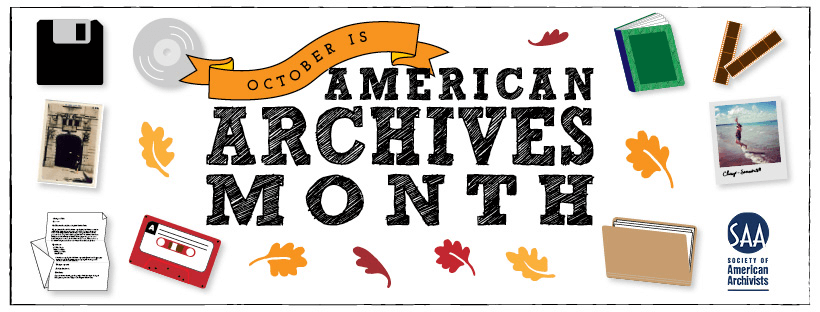Every October the archival community and repositories across the states celebrate American Archives Month. This is a way to spread awareness about the importance of archives and the value of the archival profession. Today, we share a bit about what archives are and do, talk about a new student group on campus, the Trinity University Archives Student Advocates and the push for more inclusion in our University Archives.
 What are archives?
What are archives?
The word archives refers to three different meanings:
- Archives are collections of material that present continuing evidential and informational value to their creators and to the community at large.
- An Archives is an organization or unit dedicated to maintaining the documentary heritage of a particular group or community.
- Archives as a place is a physical or digital repository where archival collections are maintained.
Why are they important?
Archives are important because the material presented is a form of documentary evidence. Material in archives is often used to understand and interpret the past. What is and isn’t in an archives can say much about documentation culture and practices overtime and the intentional and unintentional acts to include and exclude certain experiences and perspectives.
What does an archivist do?
An archivist is a professional that is responsible for acquiring, arranging, describing, and preserving – the overall maintenance of – archival material. Furthermore, their work is intended to make archival collections discoverable and accessible to the communities the archives serve, researchers, the general public, and ultimately future generations.
Little bit about our archives…
Trinity University’s Special Collections and Archives is located in room 208 of Coates Library. We collect, organize, preserve, and make available rare books, manuscripts, other special collections, and archival material to the Trinity community and researchers at large. Though not an official repository of institutional records, the university archives helps to document the history of Trinity University by maintaining transferred administrative and departmental records, as well as donated faculty and alumni papers, records of alumni and student organizations, and university publications.
Students working in the archives
Student assistants have always been valued partners in SCA. In fact, the university’s flagship archival collection at the time in the 1950s, the Texas Presbyterian Archives, was at risk of total disposal, until a student assistant came to the rescue. Here’s a recount from Theresa Simms, the university’s first librarian, explaining how special collections and archives received its first dedicated space on campus.
…Mrs. Lips discovered these awful old cartons containing the Archives, piled in a closet. She called the janitor to have them carted off and burned, when a student assistant, who knew what the cartons contained, saw the situation and shouted, ‘don’t, don’t do that! Mrs. Simms will not like it.’ Mrs. Lips came to my office to find out what ‘those old cartons’ contained. This was one of my great moments in my history experience. Mrs. Lips not only listened carefully to my description of the Archives of the Presbyterian Church in Texas, but she reacted heroically saying ‘well, these records must have a worthy place where they can be cared for and used when needed.’
Today, students work to process, digitize, and make available university material. Whether that’s in the form of archival finding aids, physical exhibits, database creation, or putting content online, students are supporting the mission of special collections and archives while learning valuable organizational and time management skills that can transfer to other work and professions.
Are students missing from the historical record?
The short answer? Yes.
While we have a full run of the Mirage yearbooks, from 1912 to present day, and consistent issues of the Trinitonian since the 1950s, material that represents student life, especially contemporary life, is greatly lacking. Material documenting student organizations is of particular interest to the university archives.
Time to think differently about archiving
It may come as no surprise that the University Archives is very administrative heavy with much of the material coming from board of trustees minutes, our communications department, presidents offices, and official publications and reports. We as an institution tend to get sentimental around anniversaries and acquire alumni material during these periods. However, archiving should be thought of as an active process where we, who are currently a part of campus life, should be more intentional about moving content into the historical record. It is a focus of the University Archives to get current students, faculty, staff, and administrators thinking about how they will and won’t be known and remembered by what is kept and not kept in the archives.
Trinity University Archives Student Advocates (TUASA)
The Trinity University Archives Student Advocates (TUASA) is a new student organization and work to support the University Archives through community outreach and collection development. They advocate for the importance of documenting and archiving Trinity student experiences which supports the university archives mission of developing a more comprehensive and inclusive institutional history by actively seeking, acquiring, and preserving content from all student groups and perspectives. In doing so, TUASA works to make the university archives more reflective and accessible to the TU community at large.
Please visit the Special Collections and Archives section of the websites to learn more. If you have questions or would like more information, please reach out to University Archivist, Abra Schnur!

Recent Comments